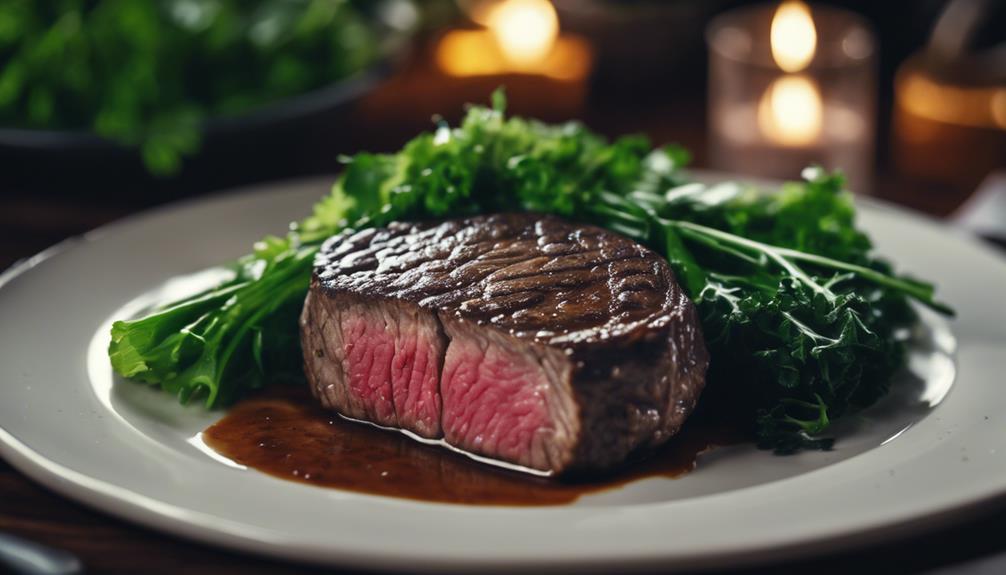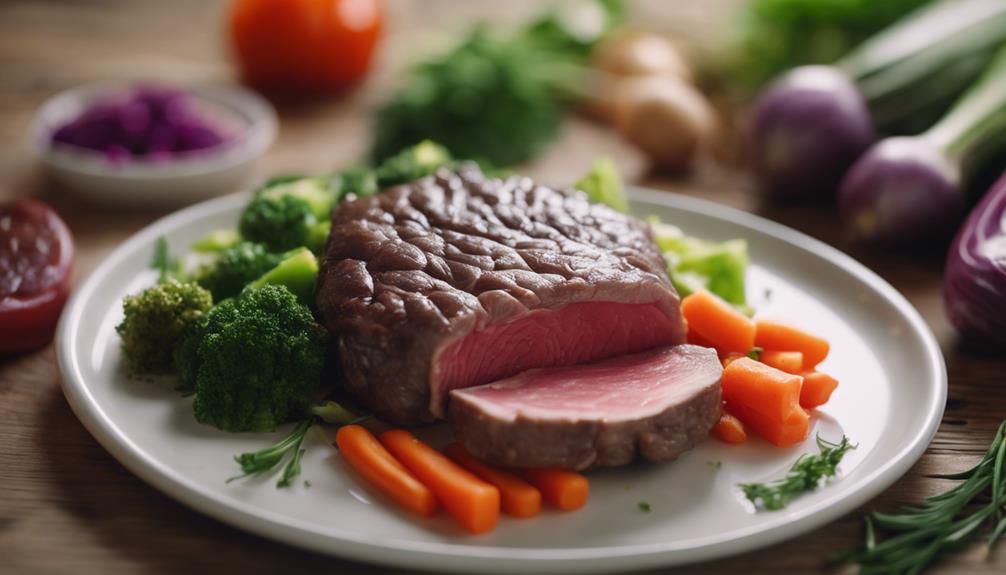
You may be surprised at the numerous advantages that come with incorporating emu meat into your diet. Not only does it offer a high protein content beneficial for muscle growth, but its low-fat composition and rich nutrient profile make it a smart choice for your overall health. The unique flavor it brings to the table can elevate your culinary experiences, but there's more to discover about this versatile protein source that goes beyond its taste. Explore further to uncover the full spectrum of benefits that emu meat has to offer.
Key Takeaways
- Rich in protein and essential amino acids for tissue repair and daily protein needs.
- Low in fat with monounsaturated fats and omega-3 for optimal bodily function.
- High in iron for preventing anemia and supporting oxygen transport.
- Nutrient-dense with B12, zinc, and selenium for a powerful nutritional boost.
- Supports muscle growth with essential amino acids aiding in repair and development.
Rich in Protein

Emu meat is renowned for its high protein content, making it a valuable addition to a balanced diet. Protein is essential for building and repairing tissues, supporting immune function, and maintaining muscle mass. Emu meat stands out for its impressive protein content, with approximately 25-30 grams of protein per 100-gram serving.
Protein is composed of amino acids, the building blocks of life. Emu meat provides a complete profile of essential amino acids, including leucine, isoleucine, and valine, which are crucial for muscle growth and recovery. Including emu meat in your diet can help meet your daily protein requirements and support overall health and wellness.
Moreover, emu meat is a lean source of protein, making it a favorable choice for those looking to maintain a healthy weight or build muscle. Its high protein content and low fat make it a nutrient-dense option that can contribute to a well-rounded diet. Consider incorporating emu meat into your meals to reap the benefits of its protein-packed goodness.
Low in Fat
Maintaining a diet low in fat is crucial for overall health and well-being, ensuring optimal functioning of various bodily systems. Emu meat provides a remarkable advantage in this aspect as it's naturally low in fat content. Emu meat is known for its lean characteristics, with only about 2-3% fat content in a serving, making it an excellent choice for individuals seeking to reduce their fat intake without compromising on taste or nutrition.
The low-fat nature of emu meat can be attributed to its unique composition, which includes high levels of monounsaturated fats and beneficial omega-3 fatty acids. These healthy fats not only contribute to the overall low-fat content but also provide essential nutrients that support heart health and reduce inflammation in the body.
High in Iron

With a significant presence of iron, emu meat offers a valuable dietary source for meeting your body's iron needs efficiently. Iron is crucial for various physiological functions, including oxygen transport in the blood and energy metabolism. Emu meat stands out as a potent source of heme iron, which is more readily absorbed by your body compared to non-heme iron found in plant-based foods. Consuming emu meat can help prevent iron deficiency anemia, a condition characterized by fatigue, weakness, and impaired cognitive function.
In a 100-gram serving of emu meat, you can find approximately 3.5 milligrams of iron, which contributes significantly to your daily iron requirements. This iron content surpasses that of many common sources like beef or chicken. By incorporating emu meat into your diet, you can ensure you're meeting your iron needs effectively. Remember, iron plays a fundamental role in your overall well-being, making emu meat a powerful dietary choice to boost your iron intake.
Lean and Flavorful
Benefit from the leanness and rich flavor profile of emu meat as it offers a satisfying and nutritious option for your dietary needs. Emu meat is remarkably lean, containing only about 2% fat, which is significantly lower than other meats such as beef or pork. This leanness makes it an excellent choice for individuals looking to reduce their fat intake without compromising on taste. Despite being low in fat, emu meat remains succulent and flavorful due to its unique composition of fatty acids and proteins.
The flavor of emu meat has been described as rich, slightly sweet, and similar to beef but with a more delicate texture. This distinctive taste makes it a versatile protein source that can be used in various dishes, from burgers to stir-fries. Emu meat's flavor pairs well with a wide range of seasonings and cooking methods, allowing you to experiment and create delicious meals while benefiting from its lean nutritional profile.
Nutrient-Dense

Emu meat stands out not only for its leanness and flavor but also for being densely packed with essential nutrients, offering a valuable addition to your diet. This nutrient-dense meat is an excellent source of high-quality protein, containing all essential amino acids necessary for muscle growth and repair. It also provides significant amounts of important vitamins such as B12, which is crucial for nerve function and energy metabolism, as well as iron, zinc, and selenium, essential minerals that play vital roles in various bodily functions.
Additionally, emu meat is rich in beneficial fats, including omega-3 and omega-6 fatty acids, which have been linked to heart health and reducing inflammation in the body. The combination of these nutrients not only supports overall well-being but also contributes to a balanced diet that can help you reach your health and fitness goals. Incorporating nutrient-dense emu meat into your meals can provide a powerful nutritional boost, making it a smart choice for those looking to optimize their dietary intake.
Low in Calories
Emu meat is a lean protein option that's notably low in calories compared to many other meat varieties, making it a favorable choice for those seeking to manage their caloric intake without compromising on nutrition. A 3.5-ounce serving of cooked emu meat contains approximately 120 calories, which is significantly lower than other red meats such as beef or pork. This calorie content makes emu meat an attractive option for individuals looking to maintain a balanced diet while keeping their energy consumption in check.
The low-calorie nature of emu meat can be attributed to its lean composition, with only about 1-2 grams of fat per serving. This is in stark contrast to fattier cuts of meat, which can contain much higher levels of unhealthy saturated fats. By opting for emu meat, you can enjoy a satisfying meal without worrying about excessive calorie intake, making it a smart choice for weight management and overall health.
Sustainable Option

With its efficient conversion of feed to meat and minimal environmental impact, emu farming stands out as a sustainable protein production option in the livestock industry. Emus are known for their ability to convert feed into meat more efficiently than traditional livestock. This means that less resources are required to produce the same amount of meat, making emu farming a more sustainable choice.
Additionally, emus have a lower environmental impact compared to other livestock. They produce less methane, a potent greenhouse gas, and their farming practices have been shown to have less impact on soil and water quality. This makes emu meat a more environmentally friendly option for those concerned about the ecological footprint of their food choices.
Versatile in Cooking
When incorporating emu meat into various dishes, its versatility in cooking methods and flavor profiles allows for a wide range of culinary possibilities. Emu meat can be grilled, roasted, pan-seared, or used in stews and soups, making it a flexible choice for different cooking techniques. Its mildly gamey flavor pairs well with a variety of seasonings and marinades, adapting easily to different culinary traditions.
Emu meat's lean and tender characteristics make it suitable for both quick cooking methods like grilling and slow cooking methods like braising. Due to its low fat content, emu meat benefits from marinating to enhance moisture and tenderness, ensuring a succulent result. Additionally, emu meat's neutral taste allows it to absorb flavors effectively, making it a versatile ingredient in dishes ranging from stir-fries to casseroles.
Heart-Healthy

Promote cardiovascular health by incorporating emu meat into your diet as a lean protein option with beneficial nutritional properties. Emu meat is a heart-healthy choice due to its low fat content and high protein levels. This lean protein source can help lower your risk of heart disease by reducing cholesterol levels and supporting overall heart function.
Emu meat is rich in essential nutrients such as iron, which is crucial for oxygen transport in the body, including to the heart. Additionally, it contains B vitamins like niacin, which aids in lowering cholesterol levels and supporting a healthy cardiovascular system.
Studies have shown that incorporating lean proteins like emu meat into your diet can help maintain a healthy weight, reducing the risk of obesity-related heart issues. Furthermore, the bioactive compounds present in emu meat possess antioxidant properties that can help combat inflammation and oxidative stress, contributing to heart health. Make a powerful choice for your cardiovascular well-being by including emu meat in your balanced diet.
Supports Muscle Growth
Incorporating emu meat into your diet can aid in supporting muscle growth due to its high protein content and amino acid profile, which are essential for muscle repair and development. Emu meat is a powerhouse of nutrients that can contribute to your muscle-building goals. The protein found in emu meat is not only abundant but also of high quality, containing all the essential amino acids needed for muscle synthesis. Additionally, emu meat is a great source of iron, which plays a crucial role in oxygen transport to muscles during exercise, facilitating performance and recovery. Below is a breakdown of the key nutrients in emu meat that support muscle growth:
| Nutrient | Amount per 100g | Benefits |
|---|---|---|
| Protein | 22g | Essential for muscle repair |
| Iron | 3.5mg | Facilitates oxygen transport |
| Amino Acids | Balanced Profile | Supports muscle synthesis |
Unique Flavor Profile

Emu meat offers a distinctive flavor profile that sets it apart from more common meat options, providing a unique culinary experience for those seeking variety in their diet. The flavor of emu meat is a result of its lean nature, which allows for a rich, yet subtle taste that appeals to discerning palates.
Here are some key points to consider regarding the unique flavor profile of emu meat:
- Rich and Earthy: Emu meat boasts a rich and earthy flavor that's distinct from traditional meats.
- Mild and Delicate: The taste of emu meat is mild and delicate, making it a versatile ingredient in various dishes.
- Gamey Undertones: Some connoisseurs appreciate the slight gamey undertones present in emu meat, adding depth to its flavor.
- Juicy and Tender: Despite being lean, emu meat remains juicy and tender, enhancing the overall dining experience.
Incorporating emu meat into your diet can introduce a new dimension of flavors, making it a compelling choice for those looking to explore unique culinary experiences.
Ethical and Humane Choice
The ethical and humane implications of consuming emu meat are significant considerations in today's society, warranting a closer examination of the industry practices surrounding this alternative protein source. Emus are typically raised in free-range environments, requiring less land and water compared to traditional livestock. This results in a lower environmental impact, making emu farming a more sustainable choice for conscientious consumers.
Emus are also generally not subjected to growth hormones or routine antibiotics, contributing to a cleaner food source. Furthermore, emus reach maturity in 14-16 months, allowing for a quicker turnaround time compared to other livestock animals. However, ensuring humane treatment throughout the entire emu farming process is crucial. Practices such as proper handling, access to clean water, and adequate shelter are paramount in upholding the welfare of these animals.
Frequently Asked Questions
Is Emu Meat Suitable for Individuals With Dietary Restrictions?
Emu meat can be a suitable option for individuals with dietary restrictions due to its low fat content, high protein levels, and rich nutrient profile. Its unique qualities make it a versatile and nutritious choice.
How Does Emu Meat Compare to Other Types of Poultry?
When comparing emu meat to other poultry, you'll be astounded by its exceptional nutritional profile. Emu meat surpasses traditional poultry in protein content, boasting lean, flavorful cuts that rival even the most esteemed options.
Are There Any Special Cooking Techniques for Emu Meat?
To cook emu meat effectively, consider its leanness. Utilize marinades to enhance tenderness and flavor. Opt for quick cooking methods like grilling or searing to preserve moisture. Rest cooked emu meat to ensure juiciness.
Can Emu Meat Be Easily Found in Grocery Stores?
You can easily find emu meat in specialty stores or online retailers. In fact, the emu industry in the United States has grown significantly in recent years, with over 1,000 farms now raising these unique birds for their lean and nutritious meat.
What Are the Environmental Benefits of Consuming Emu Meat?
When considering the environmental benefits of consuming emu meat, it is essential to note that emus require less land and water than traditional livestock, minimizing their ecological footprint and contributing to sustainable farming practices.
Conclusion
In conclusion, the nutritional benefits of emu meat make it a valuable addition to a balanced diet. Its high protein content, low fat profile, and rich source of iron make it a nutritious choice for supporting muscle growth and overall health.
The unique flavor profile of emu meat adds a delicious touch to culinary experiences. Stay tuned for more research on the potential health benefits of incorporating emu meat into your diet.




